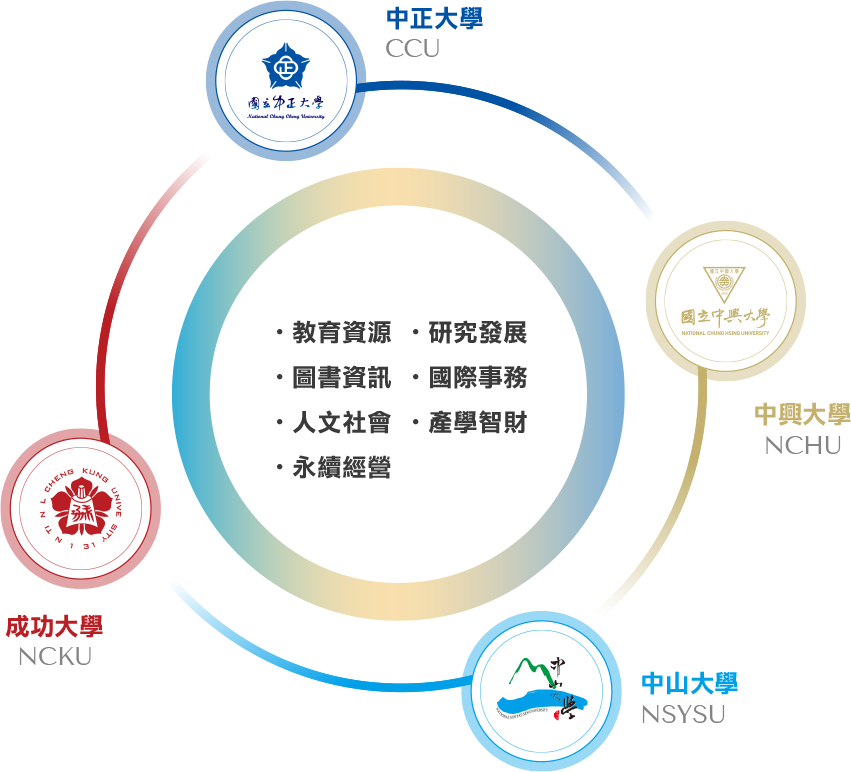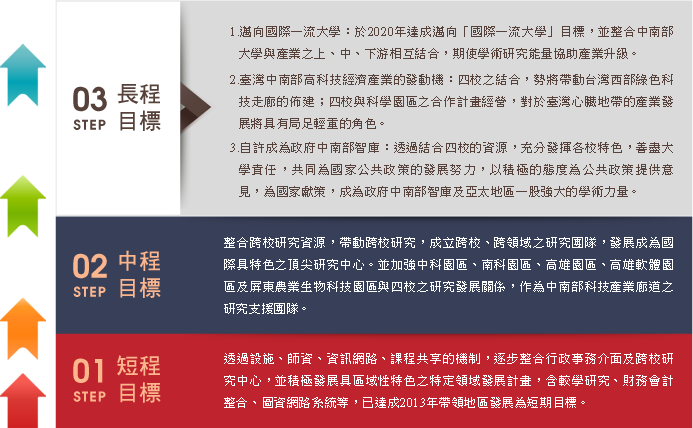- Home
- Concept of Establishment
Concept of Establishment
In response to this phenomenon, Taiwan established its first research-led university alliance in 2008: The University System of Taiwan (UST). This alliance comprises National Central University, National Yang Ming University, National Tsing Hua University, and National Chiao Tung University. The formation of UST was primarily based on these institutions' complementary academic disciplines, structural compatibilities, and regional proximity, enabling the integration of various higher education resources in northern and central Taiwan.
In 2011, under the auspices of the Ministry of Education, four major universities in central and southern Taiwan—National Cheng Kung University, National Sun Yat-sen University, National Chung Hsing University, and National Chung Cheng University—were integrated into the Taiwan Comprehensive University System (TCUS). This integration built upon their existing organizational and administrative structures. TCUS was formed to optimize the use of educational resources among its members and to balance resource availability between central-southern and northern Taiwan, aiming to create a new blueprint for higher education development. TCUS also seeks to promote academic collaborations with industry at all levels, paving the way for the development of a green technology zone along Taiwan's west coast and driving the hi-tech economy in central-southern Taiwan.
The Integration of TCUS
Since its founding, TCUS has organized nine working circles, integrating administrative resources from the four member universities. These circles manage activities related to academic affairs, student affairs, research and development, general affairs, secretarial affairs, international affairs, information security, library affairs, and accounting and statistics. By enabling staff and resources to complement each other and facilitate cooperation, TCUS has achieved substantial results across various areas in a short time. Some key achievements include:

International Affairs:
- Established a robust international cooperation platform for TCUS alliance universities
- Jointly promoted international affairs
- Integrated information and foreign language educational resources
- Strengthened common internationalization efforts
Academic Affairs:
- Implemented a distance-learning system to support intercollegiate curricula in life sciences, physics, and social sciences
- Organized conferences for faculty members within and beyond TCUS to integrate teaching resources and showcase achievements from resource sharing
- Established a joint recruiting examination for bachelor's degree transfer students based on shared academic resources (since 2016)
Student Affairs:
- Initiated the annual ZHCW Sports Event, rotating among the four universities, to promote health, teamwork, and sports spirit among faculty and students
Library Resources:
- Launched a joint project for purchasing shared electronic books, saving 42% of the annual budget allocated for library resource procurement
- Constructed an online learning platform to cultivate talents and enable librarians to share educational resources
Research and Development:
- Established a mechanism for electing outstanding young scholars for innovative research, with 16 scholars chosen from natural science, biotechnology, humanities, and social sciences
- Created a platform for managing shared instruments and facilities
- Organized lectures and award programs for new faculty members
- Provided cross-university paper publication awards for doctoral students and supervisors
- Initiated cross-university teamwork in medical care, biotechnology, welfare technology, health, and social welfare
- Integrated aging research resources to address UN Sustainable Development Goals (SDGs) and aging society issues

1. Cultivate distinguished citizens with both local concerns and international experience
2. Expand existing research achievements to develop research centers into an integrated
cluster of regional and international importance
3. Contribute academic and research achievements to industrial development and national
strategy formation
4. Develop into a government think-tank based in central-southern Taiwan
5. Become a powerful academic influence in the Asia-Pacific area
6. Establish itself as a landmark university system distinguished in Taiwan, Asia, and the
world
